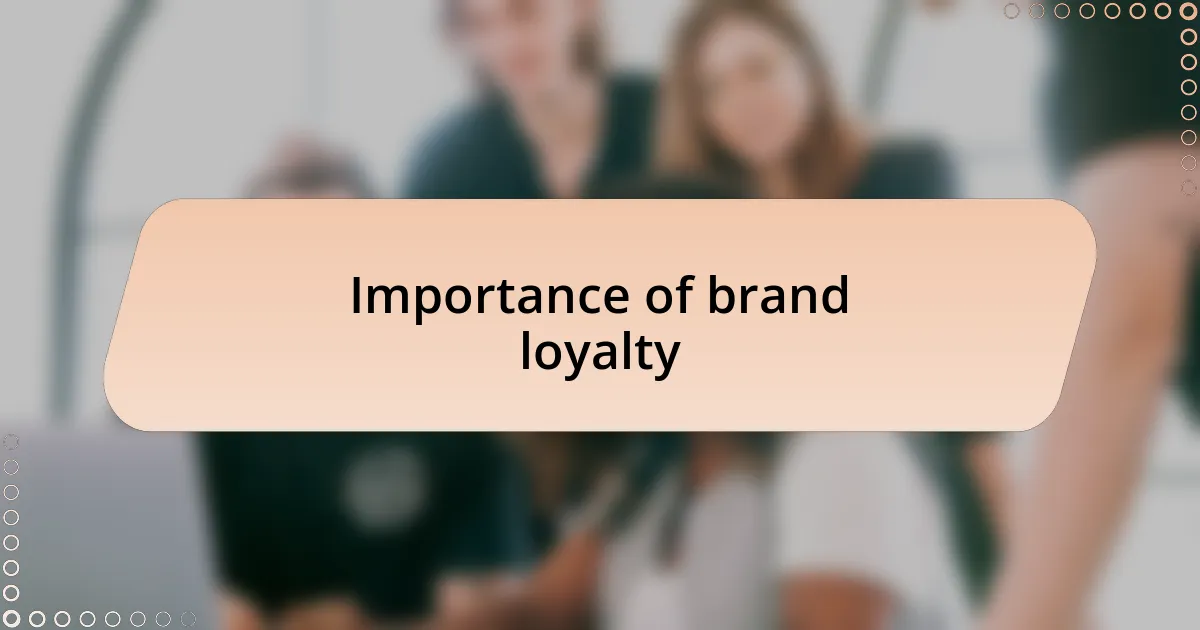Key takeaways:
- Brand loyalty is driven by emotional connections, community engagement, and exceptional customer service.
- Loyal customers often become brand ambassadors, amplifying a brand’s presence through personal recommendations.
- Implementing loyalty programs and personalized communication can significantly enhance customer loyalty.
- Marketing consulting is crucial for developing effective strategies, analyzing data, and refining a brand’s narrative to connect with customers.
Author: Evelyn Harper
Bio: Evelyn Harper is an award-winning author known for her captivating novels that explore the complexities of human relationships and the beauty of everyday life. With a background in psychology and a passion for storytelling, she weaves intricate narratives that resonate with readers around the globe. Evelyn’s work has been featured in numerous literary magazines, and her debut novel was listed as a bestseller. When she’s not writing, she enjoys hiking in the mountains of her home state, Oregon, where she draws inspiration from nature and the world around her.
Understanding brand loyalty

Brand loyalty runs deeper than just repeat purchases; it’s an emotional connection that consumers forge with a brand. I remember a while back when I chose to stick with a particular coffee brand not just for its taste but for the warmth of their marketing—every cup felt like a part of my daily ritual. Doesn’t it feel special when a brand becomes a reliable part of your routine?
Understanding brand loyalty also involves recognizing that consumers often don’t just buy products; they buy into a community or a lifestyle. I’ve found that brands that engage customers—not just through their offerings but by fostering a sense of belonging—often cultivate the strongest loyalty. Can you recall a time when a brand made you feel like you were part of something bigger?
Furthermore, loyalty can be influenced by exceptional customer service or shared values between the brand and its customers. For instance, I once had a delightful experience with a skincare brand that not only resolved my issue quickly but also made me feel valued. Have you ever noticed how that level of care can transform a fleeting customer into a devoted one?
Importance of brand loyalty

Building brand loyalty is essential because it translates directly into repeat business and sustained revenue. For instance, I remember when I became an advocate for a local bookstore after outstanding service and personal recommendations from the staff. Have you ever felt that connection when people go the extra mile? It keeps customers coming back, doesn’t it?
Moreover, loyal customers often become brand ambassadors, sharing their positive experiences within their networks. I recall a time I recommended a fitness app to several friends after seeing its consistent quality and updates. Their trust in my recommendation was a testament to how loyalty can create a ripple effect. How powerful is it when a single voice can amplify a brand’s presence?
The emotional bond created through brand loyalty can cushion a company against market fluctuations and stiff competition. I found this to be true during a price hike of a favorite snack. Instead of switching brands, I chose to support the company I had grown attached to, simply because it felt like a part of my life. Isn’t it fascinating how emotional ties can outweigh even financial considerations?
Strategies to enhance brand loyalty

Creating a loyalty program can significantly enhance brand loyalty. I once joined a coffee shop’s rewards program that offered points for every purchase, which led me to choose them over competitors. The excitement of earning free drinks made my visits feel more rewarding; have you ever felt that sense of anticipation for your next treat? It’s amazing how simple incentives can deepen our connection to a brand.
Engaging with customers through personalized communication is another key strategy. I remember when an online retailer sent me a heartfelt thank-you email after my purchase, coupled with recommendations based on my previous orders. It felt like they truly valued me as a customer, not just another transaction. How often do we underestimate the power of a genuine connection in keeping customers loyal?
Lastly, consistently delivering high-quality products or services is crucial. I once had a negative experience with a tech gadget that didn’t work as promised, and despite my initial enthusiasm, my loyalty faded. This taught me that brands must always meet—or exceed—our expectations. Have you ever experienced a brand let you down? It’s a stark reminder that trust and quality are fundamental to winning and retaining loyal customers.
Role of marketing consulting

Marketing consulting plays a pivotal role in shaping effective strategies to enhance brand loyalty. From my experience, a skilled consultant can analyze a company’s strengths and weaknesses, providing tailored guidance that resonates with both the brand and its audience. It’s fascinating how a fresh perspective can uncover opportunities that internal teams might overlook, isn’t it?
Moreover, a significant aspect of marketing consulting is the implementation of data-driven decision-making. I recall working with a client whose sales data revealed a disparity between customer expectations and their actual experience. By focusing on this gap, we revamped their approach, leading to a noticeable increase in customer loyalty. Have you ever wondered how much insight lies in the numbers we often take for granted?
Finally, the guidance of marketing consultants extends to shaping a brand’s voice and narrative in a way that genuinely connects with customers. I once observed how a redefined brand story not only clarified a company’s mission but also resonated deeply with its audience. It’s interesting to think about the narratives we gravitate towards—why do certain stories stick with us while others fade? The right marketing consultant can help brands find their unique voice, fostering a loyal community eager to support their mission.